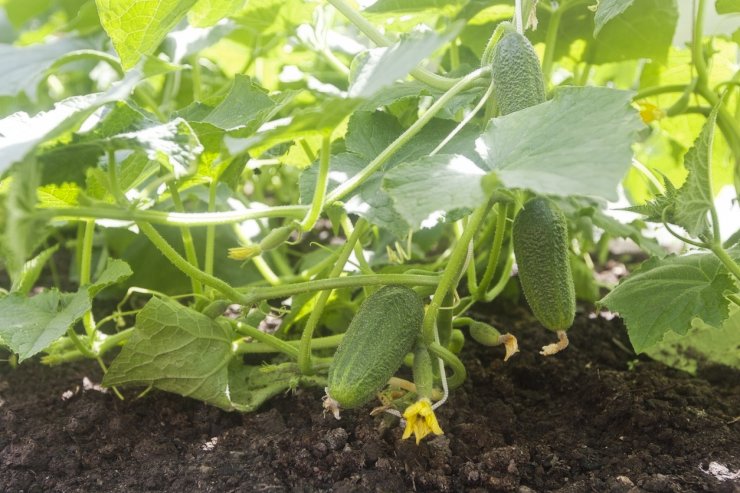
Cucumber plant with fertilizer in soil.
Cucumbers need lots of phosphorus and potassium to properly grow plentiful, healthy fruit, and fertilizers can provide the extra nutrients that cucumbers need to grow quickly and fully.
The use of fertilizer depends on the current nutrient content of your soil. To be certain, the best thing is to have your soil tested. If your soil is correctly balanced or high in nitrogen, you should use a fertilizer that is slightly lower in nitrogen and higher in phosphorus and potassium, such as a 5-10-10 mixed fertilizer. If your soil is lacking in nitrogen, use a balanced fertilizer like 8-8-8 or 10-10-10. If you can’t get a soil test, just go ahead and use higher phosphorus cucumber plant fertilizer—unless you’ve experienced past problems with sickly cucumber plants.
Avoid a fertilizer where the first number—for nitrogen—is higher than the other two. Too much nitrogen will give you lush, green cucumber plants, but very little fruit. Using straight-up phosphorus, and not a complete, mixed fertilizer, can solve this problem by minimizing the effects of too much nitrogen in the soil.
Fertilize your cucumbers when you first plant them. A side dressing of 5-10-10 fertilizer at the time of planting and once a month thereafter should be sufficient. Be sure to keep the fertilizer from directly coming in contact with the plant’s roots, otherwise it can burn the cucumber plant
Do you fertilize your cucumber plants? What type of fertilizer do you use? How often do you fertilize? Please tell us exactly how and when you fertilize your cucumber plants.


 Previous
Previous


Just curious: if Epsom Salts and an open capsule of 1,000mg of Potassium Bicarbonate is spread among some plants, will that help with cucumbers fruiting?
Hmmm!?!?!
Just be careful with epsom salts. If you don’t have a magnesium deficiency then adding too much may inhibit the plant’s ability to absorb calcium and you could end up with blossom end rot. Potassium Bicarbonate can be effective in treating powdery mildew.